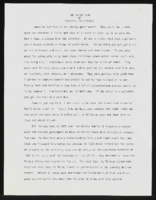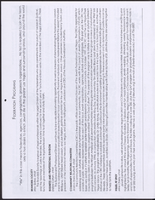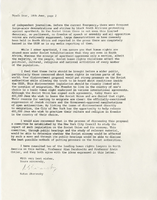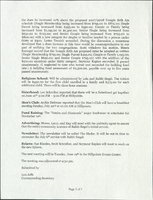Search the Special Collections and Archives Portal
Search Results
Bennett, Marion D., Sr., 1933-2013
Marion D. Bennett, Sr. was born May 31, 1933 in Greenville, South Carolina to a family of eleven. He graduated from Sterling High School and went on to Morris Brown College. After graduating in 1957, he later matriculated at the Interdenominational Theological Center in Atlanta, Georgia where he received a Master of Divinity in 1960. Reverend Bennett came to Las Vegas, Nevada on July 7, 1960 to be the pastor of the Zion United Methodist Church. Reverend Bennett fought hard to get the Equal Rights Commission established in Nevada.
Person
Las Vegas Jewish Film Festival
Las Vegas Jewish Film Festival was founded around 2001 by Joshua Abbey. It shows international films, including dramas, comedies, documentaries, and experimental films. The 14th LVJFF was held January 10 to 25, 2015 and was produced by Desert Space Foundation and the Adelson Educational Campus. Major support was provided by the Adelson Family Foundation, the Jewish Federation of Las Vegas, and the Israeli American Council.
Corporate Body

"The Sunset Kid": article draft by Roosevelt Fitzgerald
Date
Archival Collection
Description
From the Roosevelt Fitzgerald Professional Papers (MS-01082) -- Drafts for the Las Vegas Sentinel Voice file. On unacknowledged Black cowboys and soldiers.
Text



Transcript of interview with Jacqueline Baskow by Barbara Tabach, October 24, 2016
Date
Archival Collection
Description
In 1976, Jacqueline "Jaki" Baskow was an aspiring actress when she and a friend accepted an invitation to worked in a movie studio in Las Vegas. She had three-hundred dollars to her name, a dream and lots of dynamic energy. Though the movie studio offer did not quite materialized as she hoped - the invitation had come from Batman co-creator Bob Kane - Jaki's trajectory into Las Vegas, working with talents and planning events became an over forty year career. In this interview, she talks about growing up Jewish in Camden, New Jersey where her father was a murder victim; her tenacious effort to find the perpetrator included the help of celebrity detective Joe Schillaci. She shares stories of the colorful array of A-list entertainers she has worked with to build her successful business, Baskow and Associates. She has built a niche of handling large corporate events, hiring talent and attention to details for exciting events. She reflects on the people and moments that impelled her on; mentors such as Bobby Morris and Frank Sinatra and Jilly Rizzo.
Text

Interview with Bennie Reilley, Sr., May 10, 2004
Date
Archival Collection
Description
Access note: May not quote in any form without written permission from interviewee
Text

Moises Denis interview, January 11, 2019: transcript
Date
Archival Collection
Description
Interviewed by Marcela Rodriguez-Campo. Laurents Bañuelos-Benites, Maribel Calderón, and Barbara Tabach also participate in the questioning. Moises "Mo" Denis is a Cuban American born in Brooklyn, New York. He served as the first Latino Majority Leader in the Nevada State Senate and has been involved in public service for over 30 years. As a leader in the Church of Latter Day Saints and his involvement with supporting Latinx initiatives, Mo has been able to increase the representation of Latinos in politics and support educational reform. While early on his family moved around a lot, they finally settled in Las Vegas and have continued to grow their family. Mo is a Rancho High School alum and went on to graduate from Brigham Young University as a music major. He first started his career by opening a music store, but later began working in the tech industry. Eventually, through his involvement in the PTA, Mo was appointed to serve on the Clark County Library Board. There he was involve
Text


